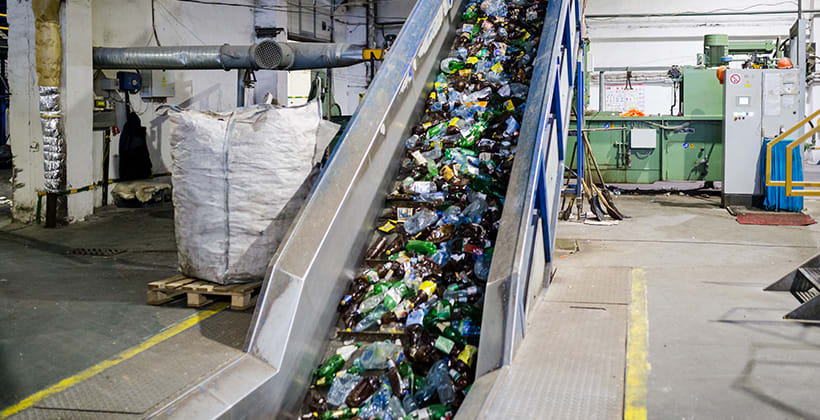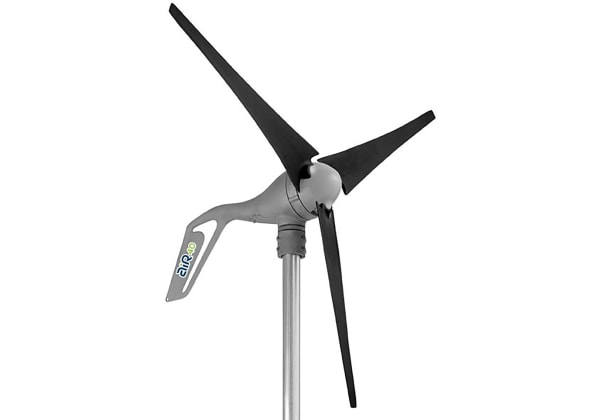- Published 16 May 2024
- Last Modified 7 Oct 2025
- 6 min
Sustainable Industrial Waste Management
Sustainable waste management minimises waste, extends the lifetime of products and materials, and recycles to prevent waste from going to landfill. Manufacturers need to focus on the whole lifecycle of their products to address waste issues effectively and implement strategies for reduction. Read our guide to find out more.

Reviewed by David Carmichael, Solution Engineer (April 2024)
Industrial waste management should always be kind to the environment. Sustainable waste management reduces the impact of manufacturing on the natural world by recycling and recovering materials to reduce the need for raw materials and by cutting back on the amount of material used in the first place. Sustainable industrial waste management also looks to minimise the release of pollutants and toxic chemicals into the environment.
Waste management best practice has several benefits, including improved health and safety (by minimising pollution), better economic performance (by using resources efficiently and cost-effectively), and improved engagement with local communities. It also helps take care of the planet for future generations.
Let’s take a closer look.
What is Waste Management?
Just what is waste management? Industrial waste management means disposing of waste, reducing waste, recycling waste, and preventing waste. Preventing waste going into landfills and using waste to create energy are two examples of a sustainable waste management strategy. Recycling waste creates new products from waste streams. Some forms of waste – electronics waste, for example – can be reconditioned or repurposed to extend their lives. It’s also important to consider reducing excessive packaging for products, and items such as single-use plastics.
Why is Waste Management Important?
Your waste management strategy is important because resources are valuable. The environment should be protected as much as possible for manufacturing to be genuinely sustainable. If waste isn’t properly managed, it can result in air, soil, or water pollution. Landfill capacity in the UK is finite, and landfills also generate greenhouse gases such as carbon dioxide and methane.
A large proportion of non-recyclable waste ends up in landfills. This is something the government wants to reduce, and manufacturers can help by recycling as much of their waste as possible or using it to create energy or electricity. Organic waste can also be composted or used to create biogas through processes such as anaerobic digestion.
Industrial Waste
Industrial waste comes in a variety of forms depending on the industry and the type of raw materials it uses. The industrial waste may be solid, liquid, or gaseous. It may be inorganic or organic. Elements of the waste may be biodegradable, while other parts may be hazardous. Waste may arise from consumer goods production, mining activities, construction, chemicals production, or food manufacturing.

Sustainable Waste Management
What is sustainable waste management? Sustainable industrial waste management uses fewer materials in the first place to reduce waste, keeps the materials in the value chain for as long as possible, and minimises waste going to landfill.
Why is Sustainable Waste Management Important?
Sustainable waste management is important because there is not an inexhaustible supply of resources. In addition, the environment must be protected from degradation by industrial processes.
The Circular Economy
You may have heard talk in recent years about a potential system where waste becomes a thing of the past. This is sometimes referred to as the ‘circular economy’.
What is the circular economy? Its long-term aim is simple: to eliminate pollution and waste altogether. In the circular economy, all industrial waste and waste from other sources is reused. Repairing and refurbishing of existing materials products also extends their life as far as is possible. An example of the circular economy is manufacturers thinking about the reusability of their products at the design phase.
The circular economy is a highly laudable aim, but with current cycles of production and consumption, it will be difficult to achieve.
Waste Management Strategy
Waste management strategy is sometimes centred on the 5Rs, which are regarded as an ideal means of dealing with industrial waste.
Waste Management Best Practice
What is a waste management plan? The 5Rs of waste management best practice are:
- Refuse. Don’t buy products or resources that are wasteful or harmful to the environment or generate a lot of waste
- Reduce. Avoid creating waste in the first place
- Reuse. When products or resources can be reused, do so. Don’t throw them away
- Repurpose. When products reach the end of their life, assess if they can be used again for another purpose
- Recycle. Once you’ve been through the other 4Rs, recycling remains the least environmentally harmful waste disposal option
Zero Waste to Landfill
As we have seen, the circular economy is some distance in the future. Zero waste to landfill, however, is an achievable aim today. According to The Carbon Trust in the UK, in practice, zero waste to landfill is a target of 99% of waste being recycled, composted, reused, or sent for energy recovery.
Reusing and Recycling
Reusing and recycling are key parts of the 5Rs philosophy. It’s important that materials, resources, and products are reused before they are recycled, which is the last phase of a good waste management strategy.
Sustainable Manufacturing
It’s vital that manufacturers continue to improve their environmental performance. With manufacturing generating about a fifth of global greenhouse gas emissions, energy – especially renewable energy – is of course a key focus of efforts to make manufacturing more sustainable, but waste management also has an important role to play.
Precious natural resources must be conserved. Pollution should be minimised. Manufacturers can start thinking about reducing waste before a design is even on the drawing board. And they should also look at every possible means of eliminating or reducing waste across the product’s lifecycle. Can it be used for a different purpose at the end of life? If it must be disposed of, can it be recycled responsibly rather than going into landfill?
Sustainable Waste Management in the Future
Management of industrial waste will continue to be of prime importance in the coming years. Waste-to-energy systems are likely to become more widespread, using waste to generate heat or electricity. Automation will play an important role in sorting waste streams for recycling and recovering a greater percentage of usable raw materials from waste. With single-use plastics a global problem, manufacturers are also looking at biodegradable packaging. Some food manufacturers are even introducing edible packages to cut down on waste.
Zero waste to landfill initiatives are already popular with construction companies and will only grow in number. The increasing connectivity of factories will also help manage waste and make the collection of waste easier and more efficient, reducing wasted journeys and carbon emissions.
The circular economy where waste is eliminated altogether may be some way off, but there are lots of practical steps manufacturers can take right now to improve their sustainability (and benefit their business and community) when it comes to waste.
Learn more about sustainability and maintenance with RS here.
Related Articles
Related links
- 2025 Waste Management Industry Review
- Making Industrial Maintenance Sustainable
- Mapa HARPON 330 Green Latex Public Park Maintenance Waste Management Work Gloves, Size 7
- Mapa HARPON 330 Green Latex Public Park Maintenance Waste Management Work Gloves, Size 8
- Driving smarter, more sustainable waste practices
- Sustainable Wastewater and Water Management
- Mapa HARPON 330 Green Latex Public Park Maintenance Waste Management Work Gloves, Size 6
- Mapa HARPON 330 Green Latex Public Park Maintenance Waste Management Work Gloves, Size 9


